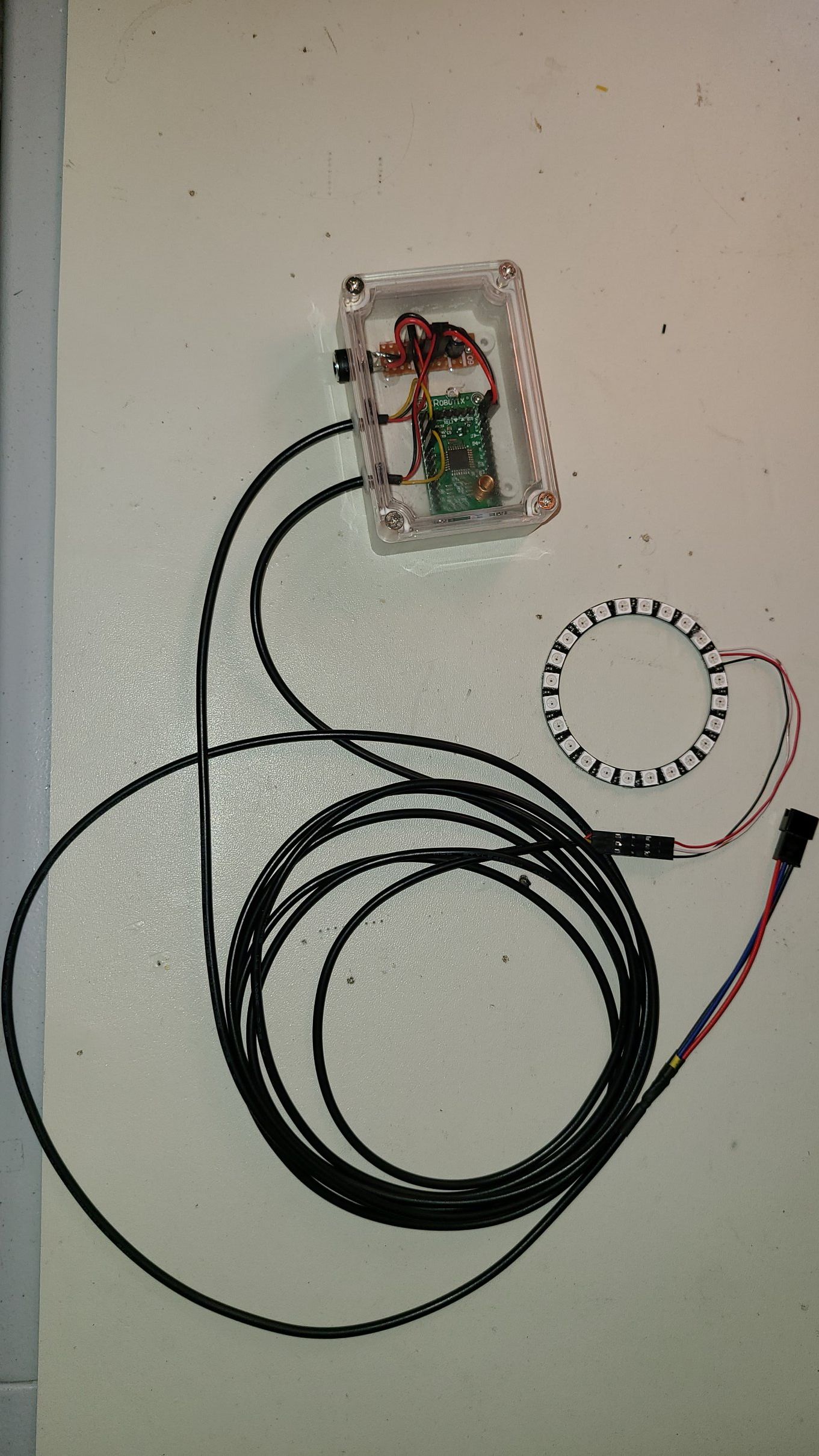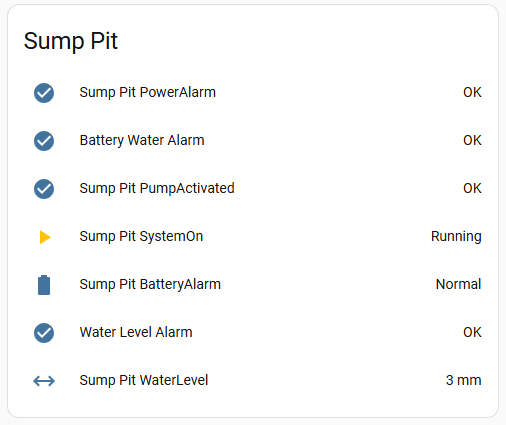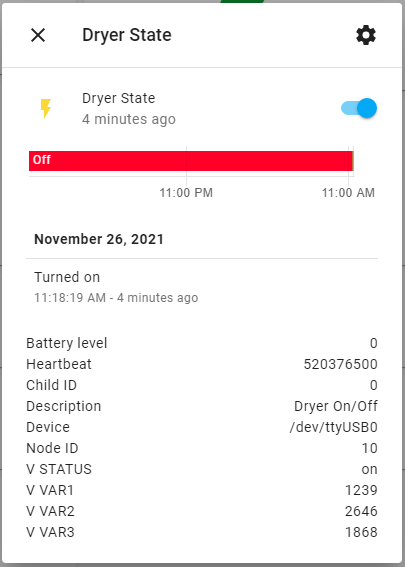Hi electrik,
Yes, my nodes send the sketch name within the presentation function.
As for the gateway, I have not set up a sketch name, the example I found did not implement this, so I didn't think it
was necessary?
I manually named the gateway node in the configuration.yaml file, and the "missing sketch name" message no longer appears in the log. I guess, I'll add an entry for node 0 (controller) as well .
I'm still getting the "USB0 not ready after 15.0 secs" at startup, but all seems to work regardless.
I connected the gateway to my pc using mycontroller, it all works fine. Logs look normal.
Here is the code for one of my nodes, a temperature node with Arduino mini & RFM69 radio, running on battery.
// Enable debug prints to serial monitor
#define MY_DEBUG
#define MY_BAUD_RATE 38400
// Enable and select radio type attached
//#define MY_RADIO_RF24
#define MY_RADIO_RFM69
#define MY_IS_RFM69HW
#define MY_RFM69_FREQUENCY RFM69_915MHZ
#include <MySensors.h>
#include <DallasTemperature.h>
#include <OneWire.h>
#define COMPARE_TEMP 0 // Send temperature only if changed? 1 = Yes 0 = No
#define ONE_WIRE_BUS 8 // Pin where dallas sensor is connected
#define CHILD_ID_TEMP 0
#define CHILD_ID_BATT 1
// function protos
void ReadBat(double& b, uint8_t& bPct);
unsigned long SLEEP_TIME = 300000; // Sleep time between reads (5min) (in milliseconds)
const int BAT_V = A0; // battery voltage, AnaIn 0
OneWire oneWire(ONE_WIRE_BUS); // Setup a oneWire instance to communicate with any OneWire devices (not just Maxim/Dallas temperature ICs)
DallasTemperature sensors(&oneWire); // Pass the oneWire reference to Dallas Temperature.
float lastTemperature;
double bat, lastBat=0.0;
uint8_t batPct;
int numSensors=0;
bool receivedConfig = false;
bool metric = true;
bool initialValuesSent = false;
bool initialValTempSent = false;
bool initialValBatSent = false;
// Initialize message objects
MyMessage msg(CHILD_ID_TEMP, V_TEMP);
MyMessage msgBatt(CHILD_ID_BATT, V_VOLTAGE);
void before()
{
// Startup up the OneWire library
sensors.begin();
}
void setup()
{
sensors.setWaitForConversion(false);
// requestTemperatures() will not block current thread
Serial.print("Found ");
Serial.print(sensors.getDeviceCount(), DEC);
Serial.println(" temperature devices.");
sensors.requestTemperatures();
}
void presentation() {
Serial.println("Sending presentation");
// Send the sketch version information to the gateway and Controller
sendSketchInfo("Temperature Sensor", "1.2");
// Present all sensors to controller
present(CHILD_ID_TEMP, S_TEMP, "Bed room Temperature");
present(CHILD_ID_BATT, S_MULTIMETER, "Bed room node Voltage");
}
void loop()
{
int16_t conversionTime = 0;
float temperature = 0;
if (!initialValuesSent) {
Serial.println("Sending initial value");
// Read in the battery voltage
ReadBat(bat, batPct);
// get temperature conversion time
conversionTime = sensors.millisToWaitForConversion(sensors.getResolution());
wait(conversionTime);
// Fetch temperature
temperature = sensors.getTempCByIndex(0);
// send the temperature reading
// set(float value, uint8_t decimals)
send(msg.set(temperature, 2));
Serial.println("Requesting initial Temp value from controller");
request(CHILD_ID_TEMP, V_TEMP);
wait(2000, C_SET, V_TEMP);
// send bat voltage
send(msgBatt.set(bat, 2));
Serial.println("Requesting initial Batt value from controller");
request(CHILD_ID_BATT, V_VOLTAGE);
wait(2000, C_SET, V_VOLTAGE);
}
// {
else {
// Fetch temperatures from Dallas sensors (non-blocking)
sensors.requestTemperatures();
// Read in the battery voltage
ReadBat(bat, batPct);
// query conversion time and sleep until conversion completed
conversionTime = sensors.millisToWaitForConversion(sensors.getResolution());
// sleep() call can be replaced by wait() call if node need to process incoming messages (or if node is repeater)
sleep(conversionTime);
// Read temperature and send to controller
// Fetch temperature
temperature = sensors.getTempCByIndex(0);
Serial.println("temperature: ");
Serial.println(temperature);
// Only send data if temperature has changed and no error
#if COMPARE_TEMP == 1
if (lastTemperature != temperature && temperature != -127.00 && temperature != 85.00) {
#else
if (temperature != -127.00 && temperature != 85.00) {
#endif
// Send in the new temperature
// set(float value, uint8_t decimals)
send(msg.set(temperature, 2));
// Save new temperatures for next compare
lastTemperature=temperature;
}
// Send in the new battery level
sendBatteryLevel(batPct);
send(msgBatt.set(bat, 2));
// Save the battery level for next compare
lastBat = bat;
Serial.println("Sleep...");
sleep(SLEEP_TIME);
}
}
void receive(const MyMessage &message) {
if (message.isAck()) {
Serial.println("This is an ack from gateway");
}
if (message.type == V_TEMP) {
if (!initialValTempSent) {
Serial.println("Received initial temp value from controller");
initialValTempSent = true;
}
}
else if (message.type == V_VOLTAGE) {
if (!initialValBatSent) {
Serial.println("Received initial bat value from controller");
initialValBatSent = true;
}
}
if (initialValTempSent && initialValBatSent)
initialValuesSent = true;
}
// b - battery voltage
// bPct - battery percent
void ReadBat(double& b, uint8_t& bPct)
{
long sumBat=0;
int i;
// take average over 64 readings
for (i = 0; i < 64; ++i) {
// read & sum battery voltage
sumBat += analogRead(BAT_V);
}
sumBat = sumBat >> 6; // shift 6 -> divide by 64
b = sumBat*3.3/1023.0;
bPct = (uint8_t)(sumBat*100.0/1023.0);
}
Here is the serial gateway sketch:
#include <SoftwareSerial.h>
SoftwareSerial softSerial(8, 9); // RX, TX
// Enable debug prints to serial monitor
#define MY_DEBUG
#define MY_DEBUGDEVICE softSerial
// You also need to create softSerial in setup()
// Enable and select radio type attached
//#define MY_RADIO_RF24
//#define MY_RADIO_NRF5_ESB
//#define MY_RADIO_RFM95
#define MY_RADIO_RFM69
#define MY_IS_RFM69HW
#define MY_RFM69_FREQUENCY RFM69_915MHZ
// Set LOW transmit power level as default, if you have an amplified NRF-module and
// power your radio separately with a good regulator you can turn up PA level.
//#define MY_RF24_PA_LEVEL RF24_PA_LOW
// Enable serial gateway
#define MY_GATEWAY_SERIAL
// Define a lower baud rate for Arduinos running on 8 MHz (Arduino Pro Mini 3.3V & SenseBender)
#if F_CPU == 8000000L
#define MY_BAUD_RATE 38400
#endif
// Enable inclusion mode
#define MY_INCLUSION_MODE_FEATURE
// Enable Inclusion mode button on gateway
//#define MY_INCLUSION_BUTTON_FEATURE
// Inverses behavior of inclusion button (if using external pullup)
//#define MY_INCLUSION_BUTTON_EXTERNAL_PULLUP
// Set inclusion mode duration (in seconds)
#define MY_INCLUSION_MODE_DURATION 60
// Digital pin used for inclusion mode button
//#define MY_INCLUSION_MODE_BUTTON_PIN 3
// Set blinking period
#define MY_DEFAULT_LED_BLINK_PERIOD 300
// Inverses the behavior of leds
//#define MY_WITH_LEDS_BLINKING_INVERSE
// Flash leds on rx/tx/err
// Uncomment to override default HW configurations
//#define MY_DEFAULT_ERR_LED_PIN 4 // Error led pin
//#define MY_DEFAULT_RX_LED_PIN 6 // Receive led pin
//#define MY_DEFAULT_TX_LED_PIN 5 // the PCB, on board LED
#include <MySensors.h>
void setup()
{
softSerial.begin(38400);
}
void presentation()
{
// Present locally attached sensors
}
void loop()
{
// Send locally attached sensor data here
}
 5
3 Votes1 Posts94 Views
5
3 Votes1 Posts94 Views

